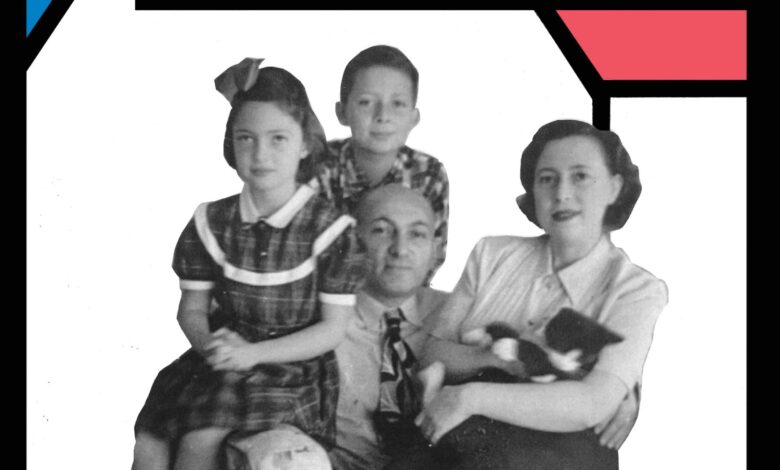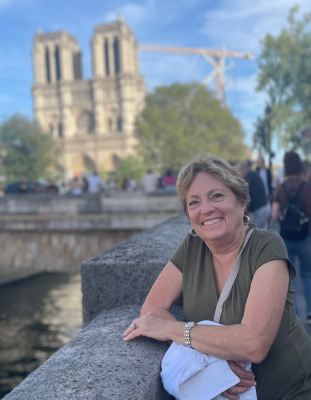Q&A with author Elana Vikan

Elana Vikan and her husband, Gary, moved to Baltimore with their two young daughters in the 1980s, when Gary was hired by the Walters Art Museum as chief curator and Elana joined the faculty at Roland Park Country School. In the decades that followed, they contributed a great deal to the city. After nine years as chief curator, Gary served as director of the Walters from 1994 to 2013, and Elana taught generations of RPCS students (myself included) not just French, Russian, and art history but also a deep appreciation for history, culture, and travel.
In retirement, Elana and Gary continue contributing to Baltimore and beyond—now, as authors. Their new book, Finding Home: How the Holocaust Shaped My Family, explores several interlinked journeys. First, there’s Elana’s parents’ gradual movement east, away from rising antisemitism in Vilna, once “the spiritual heart of Eastern European Jewry,” then to life as young marrieds in France, and then, in a high-stakes escape with their toddler son, to the United States in 1942, as World War II rages.
The book’s other two journeys belong to Elana, who was born in America in 1945, three years after that dramatic escape, and grew up mainly in Cranston, Rhode Island. As a college student at Bryn Mawr, she had a dreamy junior year abroad in France. And in 2005, Elana, Gary, and their daughters traveled to Vilna—now Vilnius, Lithuania—to see her parents’ hometown, the place where the Nazis murdered her mother’s family at the Ponary oil pits. Evocative black and white illustrations by Elana’s longtime friend, artist Fredda Brennan, complement the narrative.

BFB: An exuberant scene opens the book—it’s Passover, and your older brother, Eddy, has just gotten into Harvard, news that thrills the whole family. From there, the narrative unfolds very organically. Did you put a lot of thought into the organization in advance?
Just starting to write was the hardest part of the process for me. I had the bad habit of editing every sentence as I put it on paper. So I began by writing short vignettes in no particular order that came more readily: for example, describing the kitchen in our house, or the first time I entered the world of Maxim’s. The book’s opening scene was actually written last, to introduce the reader to my family, and to the theme of exodus.
BFB: Beyond what you knew from your parents’ stories and your father’s Providence Journal columns, how much research did you have to do into your parents’ and brother’s lives before you were born?
A good deal of research went into this account. I used history books, memoirs, historic novels, internet sources, YouTube videos, and films—mostly about Vichy, France, and the Holocaust. Top sources were Partisans of Vilna, The Sorrow and The Pity, and the Shoah films. Ancestry.com proved useful. I wrote to everyone in my past or my parents’ past to ask questions: relatives in Israel (who knew nothing, in truth), in France (more helpful), my brother’s ex-wife, and all my old friends. I pored over photographs, trying to decipher the handwriting in various languages on their backsides, while Gary was figuring out the location by the background behind the portraits. Helpful also were the letters I wrote to my parents weekly from Paris and the ones my roommate wrote to her parents, all saved. I consulted my diaries, kept from nearly all my trips. I had visited all the places in Europe I wrote about and revisited those in Paris. Of course, the notes, timelines, annotations in books, and letters to newspapers, all done by my father, were the backbone of my research.
BFB: Since I knew you first as my teacher, I was interested to learn how fundamental teaching was to your father’s mode of approaching the world. During your many years of teaching—28 at RPCS alone—how much did you ask yourself, How would my father approach this material? Am I living up to the high standards he set?
I never asked myself how my father would approach this challenge, because his modus vivendi was instilled in me by him on a daily basis, in notetaking, piano practice, critical thinking. I played schoolteacher as a child, and Papa was my model. Living up to his standards? Growing up it seemed I never could, but now, finally, yes, I think he would be pleased overall—with a remark here and there.
BFB: How did collaboration work between you and Gary, your husband and co-author? And with Fredda, the childhood friend who illustrated Finding Home?
Working with Gary, my husband of over fifty years, was an amazing bonding experience for us, akin to our compatibility in travel, the arts, and our home life. I had helped him in writing Postcards from the Iron Curtain in 2023. He did the writing but used my meticulous diary to do so. I never would have pushed through this memoir without his support. Finally I asked: Do you want me to beg you on my death bed to do this project, or would you prefer to help me do it now? He agreed and set for me the task of the small vignettes. He liked them, I trusted him, and thus began our morning routine. I would write at the kitchen table, print it out, and he would edit and comment, from the other side of the table. Little by little, adding and cutting many times, a book emerged. I knew that my own voice prevailed. But Gary was the one who organized and categorized all the photos from many albums, into years and places.
A friend from third grade on, Fredda came into the scene quite unexpectedly. She was a trained artist, and we had worked together in fun ways growing up. I had modeled in ballet costumes for her painting class, and she had illustrated my eighth grade magazine. Now we met in New York City, and over lunch Gary and I engaged Fredda to illustrate the chapters and the cover. So began a collaboration where I trusted her choices, loved her work, and both of us asked for changes here and there, until we thought we got it right. We really went back and forth for a good while.
BFB: Did writing this book lead you to new conclusions about your family’s dynamics, or about yourself?
I developed a whole new level of respect for my parents—for their bravery, flexibility, efforts, sacrifices, and values. And I felt deep compassion and affection for my brother, his genius and his struggle. The sense that I am an optimist and a rock for my own family was likely rooted in my growing years.
BFB: What advice or encouragement would you have for others who want to write in depth about their own family and personal histories?
Don’t be afraid to write! Or to learn to speak a language you once studied. Or to take up a musical instrument, or a sport. Regarding writing, I believe that everyone has a story to tell and that all stories can be interesting if told with focus in an honest, straightforward way. Writing your own family history is a precious legacy, and I encourage everyone, young and old, to do just that.
Launch Event
Come to The Ivy Bookshop patio at 6:00 p.m. on Thursday, May 8, 2025, to hear Elana and Gary discuss Finding Home. RSVP here.
Related
Source link
